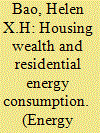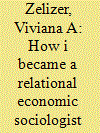| Srl | Item |
| 1 |
ID:
177487


|
|
|
|
|
| Summary/Abstract |
The housing wealth effect often manifests as a positive relationship between consumption and perceived housing wealth (e.g. the perceived value of houses). When the perceived value of a property rises, homeowners may feel more comfortable and secure about their wealth, causing them to spend more. This study adopts a behavioural approach to verify if this relationship holds true for residential energy consumption in the UK. While controlling for property characteristics and a large number of demographic, socioeconomic and energy-use behaviour variables, we identified a significant relationship between housing wealth and energy consumption. Our models also considered psychological biases in energy consumption behaviours, such as the framing effect. Our findings shed light on the behavioural aspects of housing wealth effect on residential energy consumption and demonstrate the potential to ‘nudge’ households towards energy conservation. Most importantly, we provide empirical evidence on the intriguing relationship among housing wealth, residential energy consumption and fuel poverty. The findings of this study are particularly helpful in designing and implementing energy consumption policies that can strike a balance between social justice and economic efficiency.
|
|
|
|
|
|
|
|
|
|
|
|
|
|
|
|
| 2 |
ID:
113831


|
|
|
|
|
| Publication |
2012.
|
| Summary/Abstract |
My paper proposes the concept of relational work to explain economic activity. In all economic action, I argue, people engage in the process of differentiating meaningful social relations. For each distinct category of social relations, people erect a boundary, mark the boundary by means of names and practices, establish a set of distinctive understandings that operate within that boundary, designate certain sorts of economic transactions as appropriate for the relation, bar other transactions as inappropriate, and adopt certain media for reckoning and facilitating economic transactions within the relation. I call that process relational work. After identifying specific elements of a relational work approach, the paper focuses on the case of monetary differentiation. It compares a relational work theory of earmarking money with behavioral economics' individually based mental accounting approach.
|
|
|
|
|
|
|
|
|
|
|
|
|
|
|
|